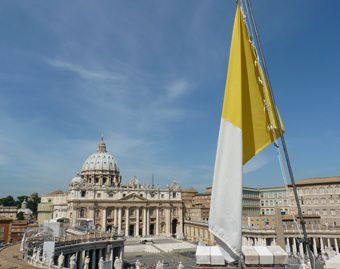The appointment of Msgr. Brian Edwin Ferme as prelate secretary of the newly established Council for the Economy shows Pope Francis will shape the council with the advice of his Council of Cardinals. Msgr. Ferme, a canonist, was reportedly the personal choice of Cardinal George Pell, a member of the Council of Cardinals and prefect of the Secretariat for the Economy. He is likely to take his post at the beginning of the summer. The priest will assist “the Cardinal Coordinator in the fulfillment of the functions of the Council for the Economy, whose competences are associated with the guidance and supervision of the administrative and financial activities of the economic entities of the Holy See,” noted the March 22 press release announcing the appointment. The cardinal coordinator is Reinhard Marx, Archbishop of Munich and Freising, and also a member of the Council of Cardinals. Msgr. Ferme is a consultor to the Congregation for the Doctrine of the Faith and the Pontifical Council for the Interpretation of Legislative Texts, and a longtime friend of Cardinal Pell, having written the foreword the cardinal’s book, “God and Caesar.” The appointment of Msgr. Ferme can be read as a halt to the rise of Msgr. Lucio Vallejo Balda, secretary of the Prefecture for the Economic Affairs of the Holy. When the economy secretariat was announced, rumors began to spread about the possibility of Msgr. Vallejo’s appointment as prelate secretary, which he did not deny. According to a Vatican source who spoke to CNA March 8, Msgr. Vallejo had been charged with organizing the secretariat’s offices, located in St. John Tower within the Vatican’s walls. This responsibility led to the belief that he would take a high post in Vatican’s new financial office. According to the source, both Pope Francis and Cardinal Pell were bothered by Msgr. Vallejo’s outspokenness with the press. Pope Francis appointed instead as prelate secretary Msgr. Alfred Xuereb, his own personal secretary and a delegate on commissions regarding the Vatican bank and the economic structures of the Holy See. After that, Pope Francis chose the members of the Council for the Economy. The eight appointed are Reinhard Marx; Juan Cipriani Thorne of Lima; Daniel DiNardo of Houston; Wilfrid Napier of Durban; Jean-Pierre Ricard of Bordeaux; (France); Norberto Rivera Carrera of Mexico; John Tong Hon of Hong Kong (China); and Agostino Vallini, vicar general of Rome.
The seven lay members have been mostly chosen from among the members of the commission for reference on the economic structure of the Holy See. Joseph Zahra is its president, and Jean Batiste de Frannsu, Enrique Llano Cueto, Jochen Messmer and George Yeo are all members. The final members are John Kyle, a Canadian reportedly backed by Cardinal Christopher Collins of Toronto; and the Italian economist Francesco Vermiglio. Msgr. Ferme, in his capacity as prelate secretary of the council and personal friend to Cardinal Pell, will establish a strict bond between the two economic bodies established by Pope Francis. The appointment of a general auditor is now awaited; this position is likely to replace the prefecture for economic affairs. The new auditor will also be picked on the suggestion of Cardinals Marx and Pell. According to the Vatican source, Pope Francis wants to build a network of cardinals and consultants who know each other very well and so are able to collaborate efficiently. Pope Francis’ team for the economy is now taking its definitive shape, and in turn will give form to the new bodies, sketching the statutes that will regulate their competencies and functions.

